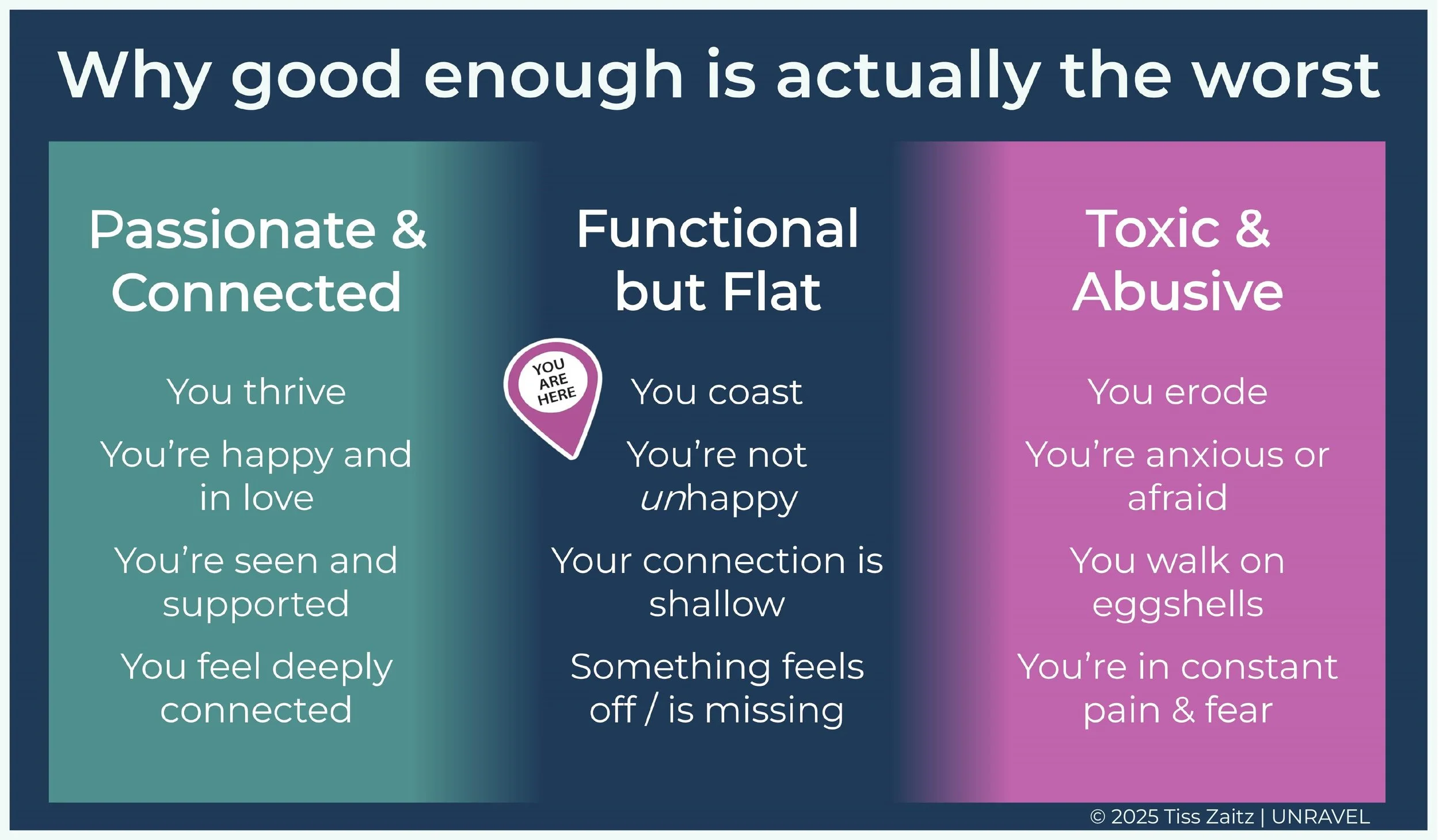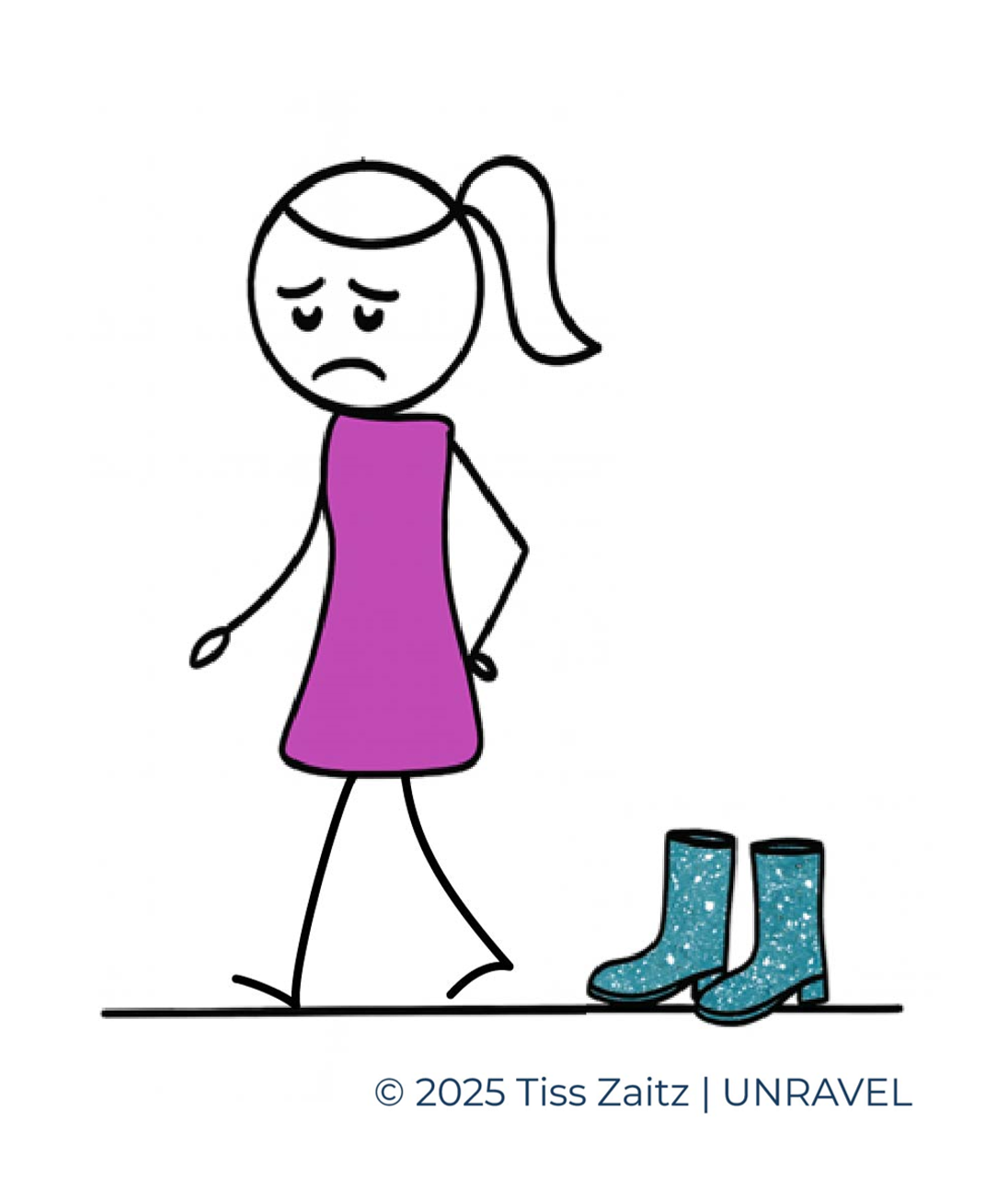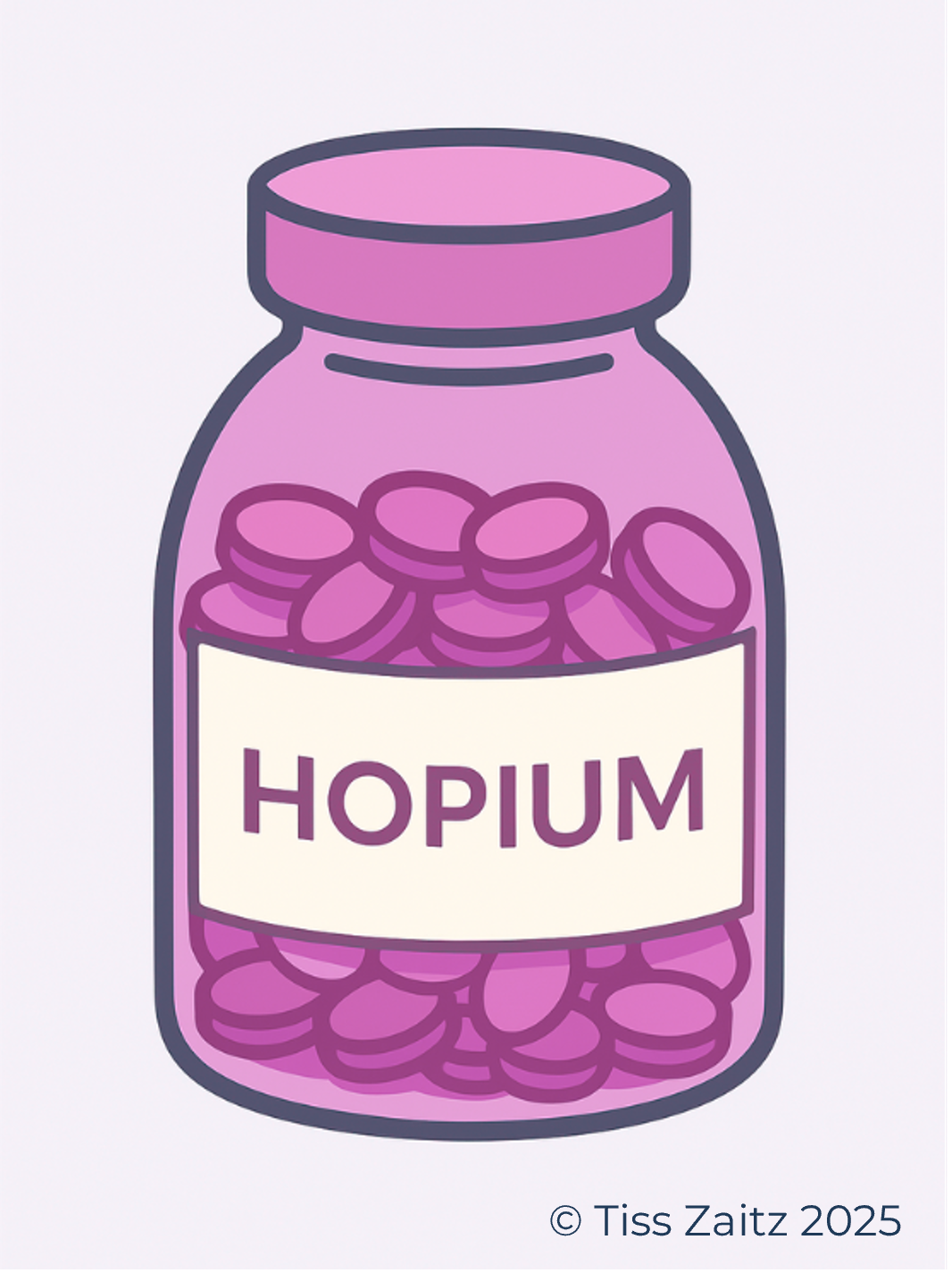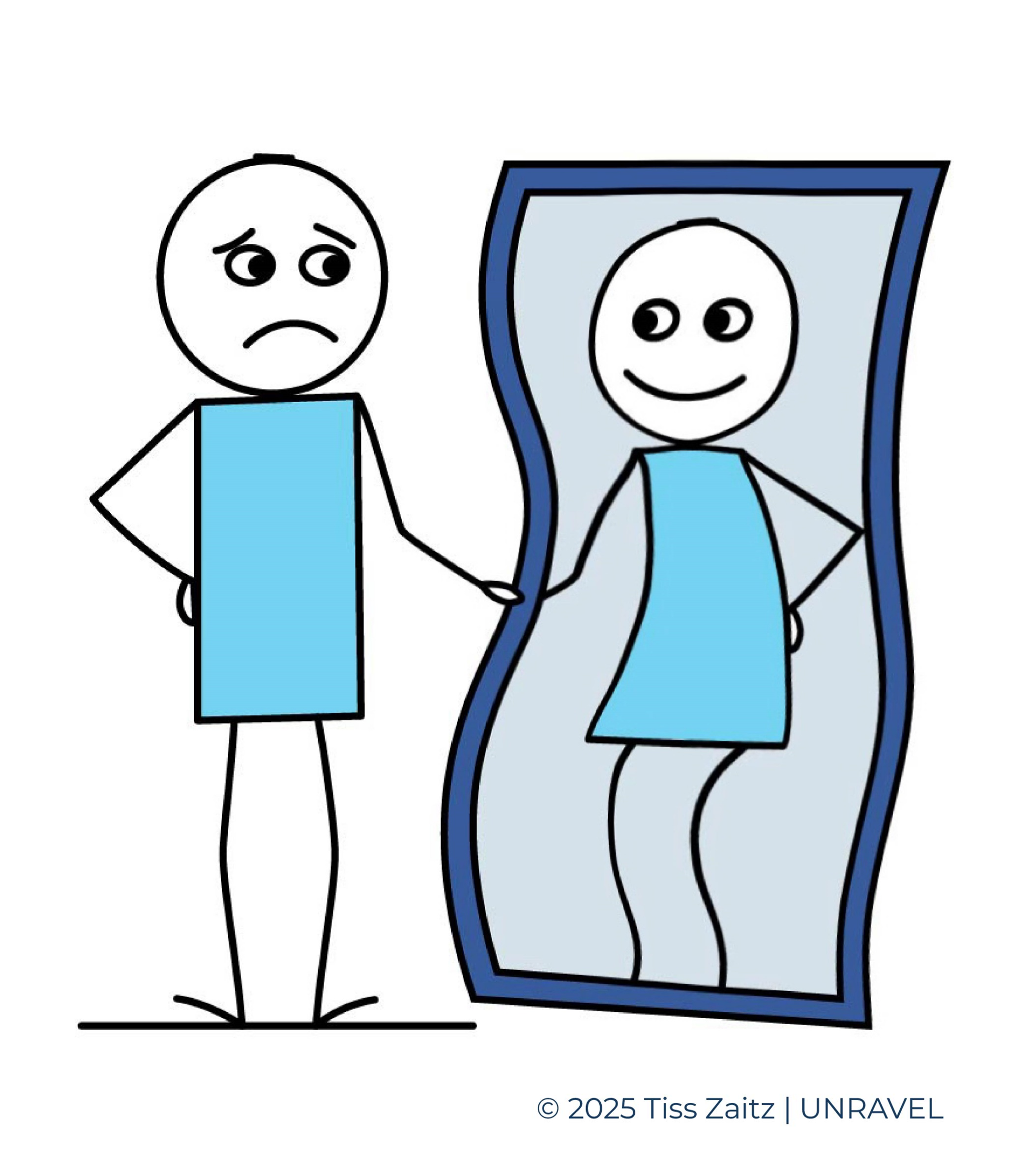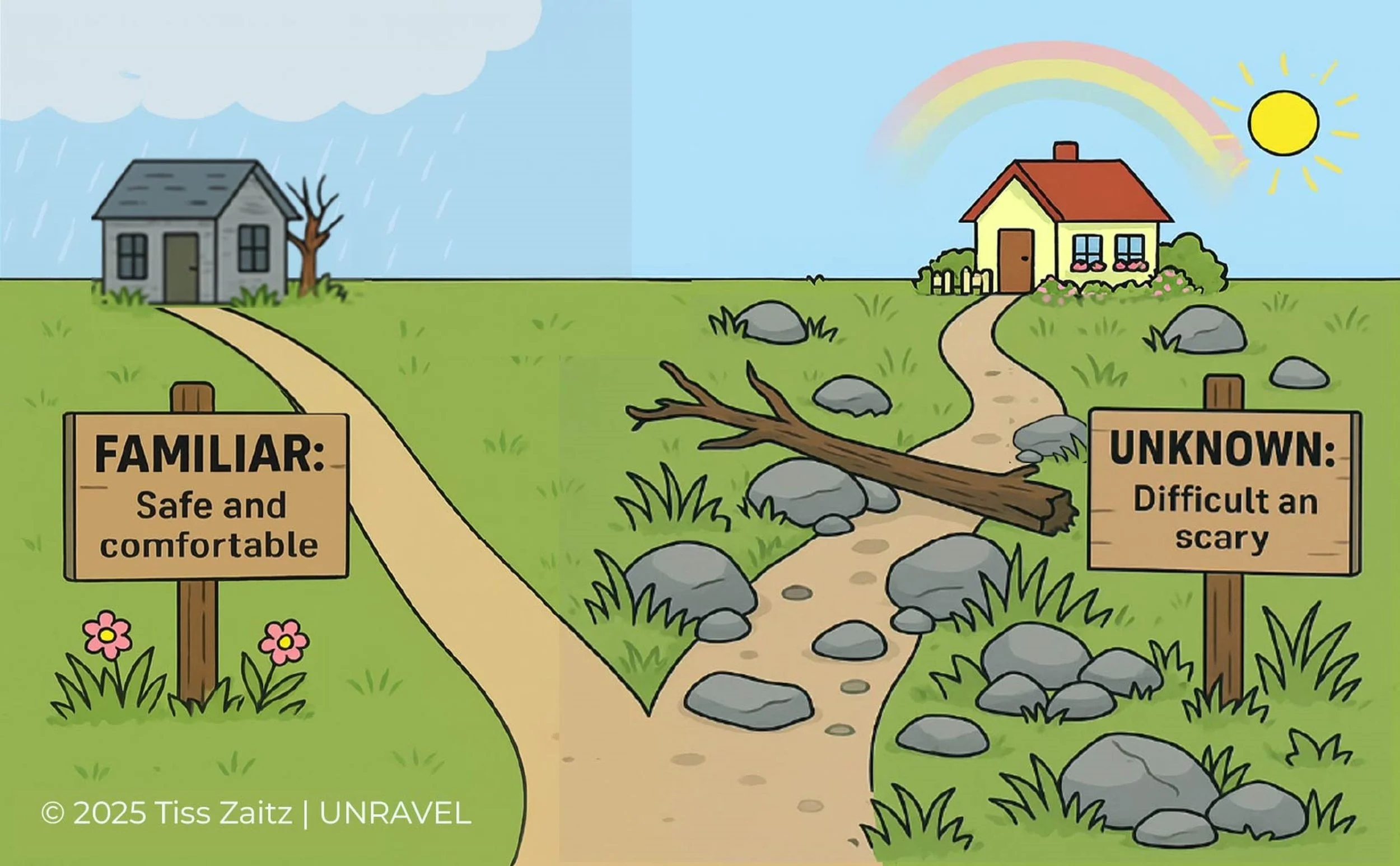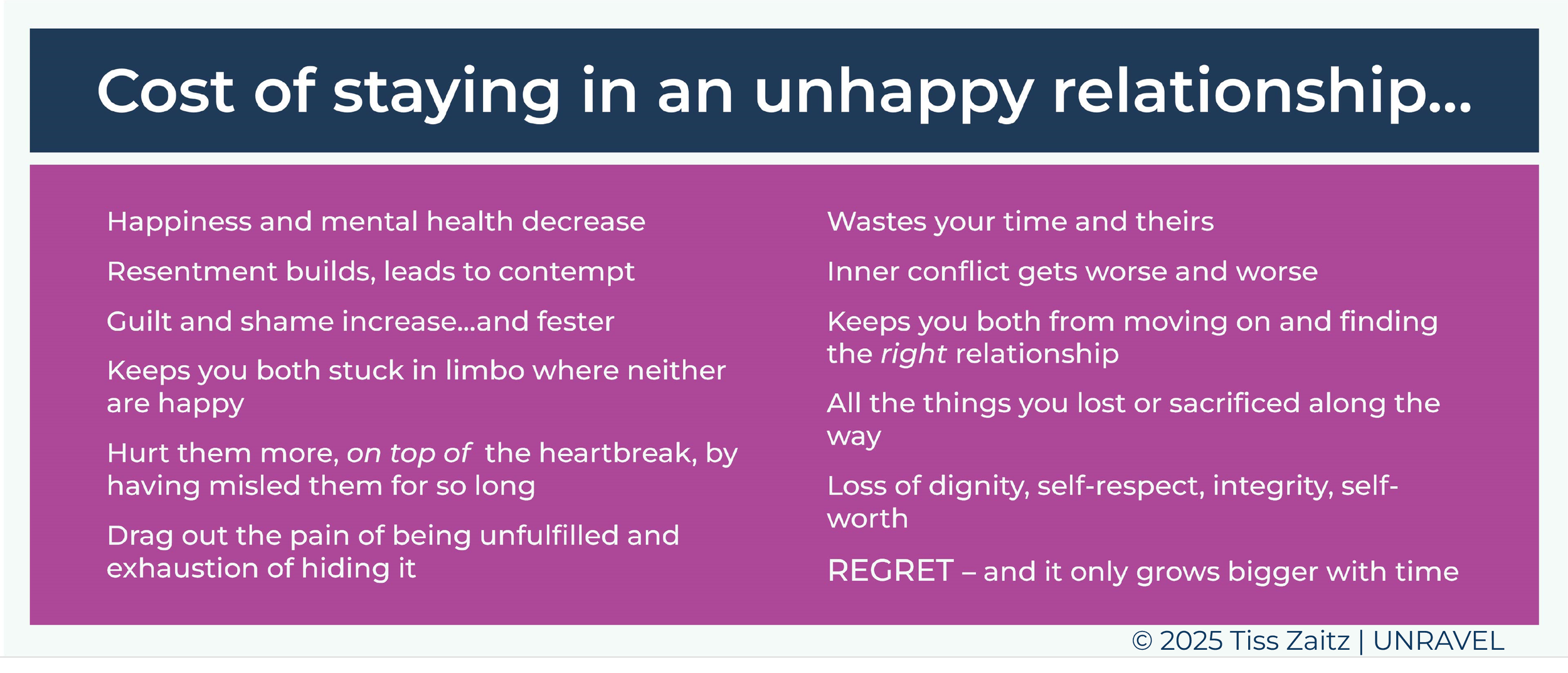
I think my relationship might be unhealthy or emotionally unfulfilling.
You’re probably not imagining things…
Not all unhealthy relationships are toxic. Most are just…off. You don’t feel unsafe, but you don’t feel deeply seen either. There’s no big betrayal or clear abuse, and you do love each other—but something essential is missing.
This journey is for the people who stay too long, hoping things will get better. The ones who keep lowering their needs and calling it growth. Who tell themselves that peace matters more than passion, or that good enough is good enough. The ones who vowed never to abandon someone the way they were abandoned. So they stay.
Some stay because it’s not so bad, or they’ve built a life and don’t want to disrupt it. Others don’t want to lose the time they’ve invested or be single again. Some just don’t want to be the “bad guy” when their partner hasn’t done anything wrong.
None of that means you don’t care, love can exist in a relationship that isn’t working. Sometimes two people just don’t fit the way they hoped they would. It doesn’t mean someone’s not trying hard enough or that anyone expects too much, it just means needs aren’t being met. When something feels missing, it usually is, and it’s tough to stay emotionally all-in. If you’re starting to check out or having a lot of doubts, your partner likely senses that and feels something missing, too. It’s not a bad match, just a mismatch.
This isn’t about blame. It’s about naming the kind of relationship that drains you quietly, not through cruelty but through complacency.
Whether you’ve left or stayed, whether you’re the one who wanted more or the one who couldn’t give it, you’re in the right place.
Why good enough is actually the worst
Emotionally unfulfilling relationships are hard to name because everything looks good on the surface. No betrayals, no explosive fights, no on-again-off-agains. Maybe you get along splendidly, like great friends. You have routines, inside jokes, travel plans. But underneath all that, something’s not quite right.
When you’re truly in a happy relationship—you’re in love, connected, and fulfilled, you know it. You don’t have to rationalize doubts or pretend anything. When you’re relationship is toxic or just disconnected and full of internal conflict, you know it. You don’t question these things because you don’t have to. You don’t have a single doubt.
It’s when you’re uncertain, questioning, complacent, that you should be concerned. When nothing is actually wrong, but things don’t always feel right. You’re not unhappy, and your partner hasn’t done anything bad. In fact, they’re pretty good to you, yet it feels like something is missing.
It’s when you’ve accepted that maybe this is the best you’ll get even if it’s not what you hoped it would be. Your relationship might be pleasant and loving, but you can’t help but hope something gets better. This is the middle—relationship limbo—where you’re not happy, but nothing is technically wrong. It’s confusing and can leave you unsure what to do.
Bottom line: Miserable relationships will lead to action because things are too bad to stay the same. If they aren’t bad enough, though, you won’t take action. You won’t disrupt the status quo until it becomes absolutely necessary.

Imagine finding a pair of shoes that seem perfect—your style, your color, they go with everything. You love how they look and how they make you feel. But after wearing them for a while, you realize they’re not that comfortable. They pinch, rub, or leave blisters, but you love them, so you keep wearing them.
Eventually, you start planning your days around them, choosing activities that won’t leave you standing too long. You tell yourself it’s worth it because they’re your favorite shoes. But over time, the mild discomfort turns into sore feet, then knee pain, then back pain.
You hold onto them because you’ve invested so much in them, you’ve shown them off and your friends all like them. But after a while, the excitement fades. You’re just tired of hurting. When you finally let them go, it’s not because you stopped loving them—it’s because they were never the right fit.
The pain doesn’t disappear overnight, but it fades. And you realize if you’d stopped wearing them sooner, you could’ve saved yourself a lot of unnecessary damage. There was never anything wrong with the shoes. Letting them go was hard, but keeping them hurt more.
Let’s break this down from another angle
You’re not happy, but things aren’t bad, so you find reasons to stay. You tell yourself it’ll get better when you move in, get married, relocate, or change jobs. You don’t want to lose your partner or the future you imagined.
Then the doubts creep in. What if you don’t deserve the love you want? What if this is as good as it gets? What if you leave and regret it when it’s too late? Maybe it’s just safer to stay. After all, you get along, you have fun, you want similar futures; it works, even if something deeper is missing.
But that’s a safety net, not a love story.
On paper, you’re perfect together. Your friends think you’re a great couple. You don’t want anyone to know you’ve ignored red flags or convinced yourself that if you just do everything right, things will change. What would people think? What does it say about you?
And you do care about your partner—you don’t want to hurt them. After everything, you tell yourself you owe it to them to stay. But that thought, the one that makes leaving feel like failure, is exactly what keeps you stuck. The constant ‘should I stay or should I go’ is called emotional ambivalence. It’s the emotional tug-of-war you live with every day. Eventually, you’ll make a change because you get tired of how much it actually hurts, just like the shoes.
These are tough pills to swallow.
So you stay high on hopium—the addictive hope that persists despite all evidence to the contrary. It let’s you feign optimism and ignore reality. Why walk away now (when you can waste a few more years of your life (and theirs) pretending to be happy, endlessly hoping things will get better?)
Why start over now (when you can double down on denial, wait until things deteriorate further, and start over when you’re a few years older?)
When you think about it like that, it sounds pretty absurd, doesn’t it?

It’s almost impossible to see things so clearly when it’s happening to you, and you might feel stuck between two worlds. Let’s see how this looked for Bob & Sally.
Bob and Sally are both good people and they care for each other very much, but while nothing is technically wrong, neither of them are truly happy. That isn’t anyone’s fault, it’s just not the right fit. Sally wants more but doesn’t know if she’ll find anyone better than Bob, and it would be unfair to hurt him when he’s done nothing wrong. Bob can tell something isn’t right and is insecure about their relationship at times, but he’s scared of losing her, so he doesn’t bring it up.
The relationship is built on secrecy and mutual avoidance. From the outside, they look happy and their relationship appears strong and stable, but it’s really just a house of cards. Bob & Sally seem to think if they pretend the issues don’t exist, they’ll go away.
It’s only a matter of time before one of them reaches a breaking point, and all the cards will fall. The only question is how long they’ll keep pretending, and how much of themselves they’ll lose before one of them finally calls it.

The bigger picture
This is a common situation. It’s normal to question things when a relationship reaches a turning point—getting serious, moving in, making a big commitment. But if you’re still questioning later, especially more than once, it may be a sign you’re in the wrong place.
How you handle those thoughts matters too. If you catch yourself negotiating in your head (“I’m not truly happy, but they haven’t done anything wrong” or “I’m not sure if I should stay, but I don’t want to blow up my life”), that’s shaky ground. This is also part of emotional ambivalence.
The “but” is how you minimize your needs to avoid the truth. It’s how you make yourself smaller to keep the relationship, until you realize you’ve sacrificed your happiness for something that isn’t working—for either of you.
Owning Your Truth
This journey is here to help you recognize these patterns—to separate your nervous system’s pull toward familiarity from your deeper need for connection and fulfilling love.
It’s not about blame or shame. You’re not doing anything wrong. Even if you’ve known for a while and dragged it out, even if you or your partner made sacrifices that now feel wasted, you’ve been doing the best you can with the tools and nervous system you have. Don’t let shame stop you; shame is judging an earlier version of yourself by what you’ve learned since, and that’s an unfair judgment to make.
Think of it this way, you can either face the mistakes you’ve made, or you can continue making them and delay the fallout, which only gets worse: You can be honest with the people you’ve hurt and stop hurting them, or you can continue hurting them until it blows up later.
Owning the truth and seeing things as they really are might be hard, but it can also bring real relief.
Know that what you’re experiencing is very common but rarely talked about, which can make you feel like you’re the problem when you’re not. You’re not alone in this.
This journey is about giving language to something most people don’t even know exists. It’s about making sense of your confusion and your mistakes. If you’re here, you already know something’s off—now you can finally see what it is.

Why We Stay
Even when you know something isn’t right, staying can feel easier than facing what comes next. The idea of hurting someone you care about or dismantling the life you’ve built can feel unbearable. So you wait. You give it more time. You try harder.
But staying often just spreads out the pain over time. If you’re unhappy and hoping things will change, you’re choosing to stay unhappy while quietly bracing for the fallout. Deep down, you know the change you need is coming. And the longer you stay, the harder it will be—for both of you.
Maybe leaving feels unfair. You’ve come this far, so you tell yourself to make the most of it. You don’t want to be single again, lose comfort, or let go of the future you imagined. You don’t want to face the logistics of breakup or explain what happened to friends and family. Maybe you’re afraid you won’t find someone better, or that not making this work makes you a failure.
Whatever the reason, you stay even though you know something’s off. That means investing more time in something that probably won’t last, and keeping your partner in a relationship that isn’t what they believe it is. You think you’re doing right by them by staying and giving everything you can, but that’s not love. They may be making a trade-off they don’t even know about.
It feels like the pain of breaking up would be unbearable, but here’s the truth: leaving will cause you both a lot of pain; staying will cause you both a lot of harm. The pain of leaving is temporary—you’ll both heal in time. But the damage from staying lingers long after the breakup, sometimes in divorce papers, custody schedules, or shared assets that drag it out when you just want to move on.
But all that? You might think that’s a future you problem. Right now you just want to avoid present you pain. All of these are defense mechanisms built into your nervous system. They don’t make you a bad person or a failure. It’s physiology not morality.
None of this makes you selfish. It makes you human—someone in an impossible situation with a nervous system doing everything it can to protect you from loss, uncertainty, and fear, even if that means keeping you stuck
The familiar road feels safer and more comfortable, but it may not lead you where you want to go. The unknown road seems impossible at first, but in the long run, you might find exactly what you've been looking for.
The Cost of Staying
Staying when you’re not truly happy drains you. You lower your expectations, quiet your needs, and shrink yourself just enough to keep the peace.
Avoidance feels protective, but it’s what keeps you stuck. You’re not actually protecting your partner or your relationship—you’re protecting yourself from the discomfort of hard truths and tough decisions. And waiting doesn’t tend to change anything, it just drags it out for both of you.
Your partner may sense your distance but not understand it. They might feel confused or walk on eggshells. Or maybe that’s you, wondering why everything looks fine but still feels off. You avoid conflict and pretend to trust when you know something isn’t right.
Now both of you are pretending to be happier than you are. Each is trying to hold together a relationship that isn’t right. The irony is that one partner often stays for the other’s sake, believing leaving would destroy them. But staying is often what’s really doing the damage.
This isn’t just about staying in the wrong relationship—it’s about what staying does to both of you..

So how do you know what to do?
There’s a cost to staying, and a cost to leaving. Both hurt. Most people choose the one that hurts less now—which is usually staying. But avoiding pain now almost always means facing worse pain later. Staying has consequences; they’re just quieter, and as long as you stay, they’ll keep accumulating.
Leaving brings sharper pain, but it’s temporary. You might blow up your life, but a year from now you’ll likely be in a better place. Staying spares you a brutal few months, but a year from now you could still be unhappy, hurting, and scared to decide. It’s choosing between a swift blow and then you recover, or death by a thousand papercuts.
We’re hardwired to maintain the status quo until we have an irrefutable reason to leave. Being unhappy usually isn’t enough. We endure what’s bearable and wait until we’re sufficiently miserable before we act.
You don’t have to choose yet. But you do need to see that both paths are hard. Avoiding a hard choice doesn’t protect you; it just delays the impact until it hurts more.
Whether you’ve been together one month or five years, what you do next isn’t just about what you want, It’s about what it’s already costing you to stay exactly where you are.
You don’t have to be ready to act. But the fact that you’re here, questioning, noticing, trying to make sense of things—that matters.
It’s incredibly difficult to admit that something’s off. It can be terrifying and painful. Just seeking answers takes immense strength and courage, and you’re doing it.
That’s a huge step in the right direction.

Before you go…
I sincerely hope this journey gave you something valuable: clarity, comfort, validation, maybe even a little relief from the confusion. If you’re feeling overwhelmed, raw, or unsure what comes next, that’s okay. You’re doing hard things. Really hard things.
If and when you want to keep going, UNRAVEL has more to offer. The Foundations are the building blocks, they explain the underlying mechanics of relationship behavior. The Models & Frameworks show how those mechanics create and reinforce the patterns people get stuck in.
The information is in a slightly more academic tone, as these pages take on a more educational perspective…but still in clear, relatable language. You won’t find any 7 syllable words or sciencey jargon here.
I’d also love to hear your story. If you feel like sharing, you’re more than welcome to do so here. Your experience matters.
Thank you for trusting me to guide you. I wish you a lifetime of healthier, happier relationships.
Every relationship is unique, and emotional harm doesn’t always follow the same patterns. What you’ve read here reflects common dynamics, but it’s not a diagnosis. I hope something resonated, but please know this isn’t therapy or psychological, medical, or legal advice. It’s here to offer clarity, not conclusions.
